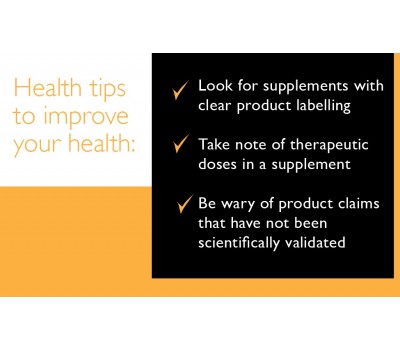Not All Supplements are Created Equal

Have you ever walked into a shop and felt lost when you look at the many different brands on the shelves, all offering the vitamin C that you were looking for?
Do brands matter? Are some forms of vitamins and minerals better absorbed than others? Do the prices reflect the quality? Why does one contain only 100 mcg of folate while another contains 800 mcg?
The quality of supplements does vary widely. Below are some tips that could help you in selecting supplements:
- Look for clear product labelling
Ingredients and their respective amounts should be listed clearly. Avoid supplements that provide vague or little information. To illustrate, a calcium supplement should state its form (e.g. calcium bisglycinate is far more superior to calcium carbonate) and dosage (e.g. 600 mg). A probiotics supplement should state what bacteria strains it contains instead of just ‘probiotic blend’.
- Look for therapeutic doses
Therapeutic dosage refers to the minimum amount of a nutrient that will provide real benefits. Be wary of ‘rojak supplements’ that contain a long list of impressive ingredients, but all in very small doses. They may not be of much use! E.g., a B-complex supplement containing 5 – 10 mg of B1, B2 and B3 is not going to give you the same energy boost as one supplying 25 – 50 mg of these vitamins.
- Cost vs value
A high price tag may not indicate quality – huge marketing expenses or multilevel marketing distribution can drive up prices. However, quality supplements will not be dirt cheap either.
- Look for a reputable company or brand
Check the company website for information on the science and research behind the products. Call/email them if you have questions – companies that ignore your queries or provide dubious answers may be unreliable.
- Absorption efficacy
Some supplements need to have a special coating for delivery and absorption efficacy. E.g. Probiotics capsules need to be coated to ensure the good bacteria are not destroyed by stomach acid before reaching the intestine.
Certain supplements contain synergistic ingredients that aid the efficacy of the main ingredients. E.g. Dihydroquercetin helps vitamin C re-circulate throughout the body, enabling it to last longer.
Some supplements are better absorbed and utilized by the body in one form than another. E.g. CoQ10 is better as Ubiquinol than Ubiquinone; Vitamin D3 is much better than D2; Vitamin B12 is more effective as Methylcobalamin than Cyanocobalamin.
- Be wary of claims or ‘trendy’ supplements
Some supplement sellers claim that their products can treat or cure diseases, but many of these claims have not been scientifically validated. Do your own research or ask them for the relevant research evidence. Also, every now and then comes a craze about a new supplement. Find out more before you jump on the bandwagon.
If you are taking supplements regularly, it is important to learn how to choose good quality ones so that you will reap the maximum benefits from your supplements and also spend your money where it is worth.


Social Login